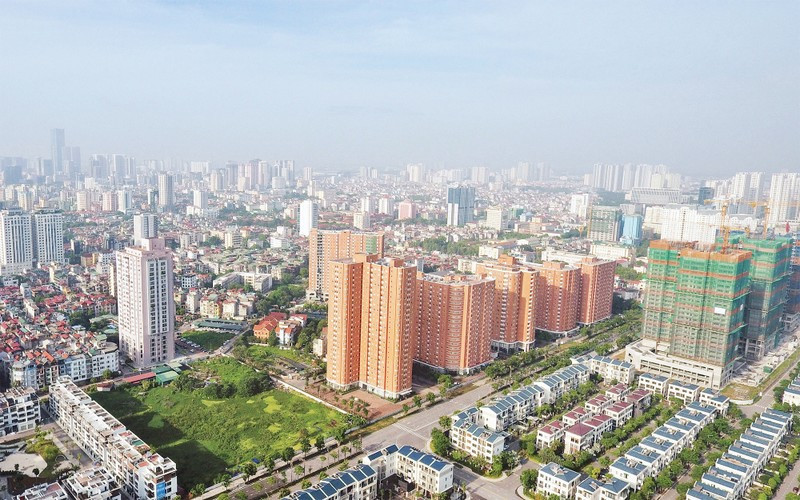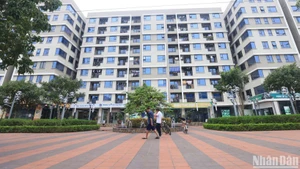Stabilising and developing the real estate market is one of the key issues of policy management in 2023. Since the beginning of the year, the government has issued many important policies to remove difficulties for the market, such as Resolution No. 33/NQ-CP on several solutions to remove difficulties and promote the safe, healthy, and sustainable development of the real estate market; and Decree No. 08/2023/ND-CP on offering and trading corporate bonds.
Many potential risks and uncertainties
At the end of April, the State Bank of Vietnam implemented a credit programme for social housing, worker housing, renovating, and rebuilding old apartments according to Resolution No. 33/NQ-CP, with a large scale of 120 trillion VND. The Ministry of Construction also issued guiding documents on conditions and authorized localities to publish the list of social housing investment projects for loans.
Recognising the difficulties of the current real estate market, Deputy Head of the Central Economic Commission Nguyen Duc Hien pointed out that in the first quarter of 2023, the number of newly established businesses in the real estate sector decreased by 63.2% from the same period last year, while the number of enterprises dissolved or ceased business with a term increased by 30.2% and 60.7%, respectively. Additionally, about 30%-50% more exchanges had to close or suspend operations compared to the previous quarter.
According to a report by Fiin Group - an integrated service provider of financial data, business information, the real estate is the industry with a bad debt ratio of bonds up to 20.1%, second only to the energy industry (63.1%).
According to Prof. Dr. Pham Hong Chuong, President of National Economics University, the real estate market is revealing many limitations, shortcomings, a lack of sustainability, potential risks, and unhealthy development. Risks in the real estate market can spread to the financial and monetary market because most of the capital into the real estate market is from bank credit flows.
The data published in the annual publication on Vietnam Economic 2022 of the National Economics University shows that Vietnam's real estate sector saw a surge in credit in 2022, with outstanding loans reaching 2.58 million billion VND, equivalent to 21% of total credit outstanding and about 26.3% of GDP. The growth rate of credit capital flows from the commercial banking system to the real estate sector in 2022 was about 24%.
Solving legal problems
Analysing the relationship between economic growth and the evolution of the real estate market in Vietnam, Prof. Hoang Van Cuong, National Assembly deputy and Vice Director of National Economics University, emphasised that economic growth is the driving force for the real estate market and vice versa, the development of the real estate market will have an impact on economic growth. The development reality of Vietnam's economy shows that, during periods of good economic growth, the real estate market also achieved a high growth rate. The spill over of the real estate sector to the economy is very large because real estate has a direct spill over effect to 40 industries and occupations in society, contributing 3.46% to the national GDP in 2022.
The important role of the real estate market is also reflected in the direct relationship with the financial, monetary, securities, capital, construction, and labour markets. From the close relationship between the real estate market and economic growth, Prof. Hoang Van Cuong said that the current real estate market has similarities with the period 2011-2013, but the probability " freeze" is very low. Because the economy is currently facing many difficulties after the COVID-19 pandemic, there is still a prospect of recovery and growth, not declining as in 2011-2013.
Moreover, new policies issued since the beginning of the year have shown the involvement of the whole political system. The timely, drastic, and close direction and management of the Government to remove difficulties for the market is expected to have a positive impact. In the short term, Prof. Hoang Van Cuong proposed that the Government soon end the inspection and handling of suspended projects so that businesses can continue to deploy and bring products to market.
In addition, it is necessary to focus on solving legal problems from the central to local levels by establishing committees to immediately handle existing problems.
The recommendations of the National Economics University are aimed at perfecting the legal system, adjusting supply and demand, increasing information transparency, and opening capital for the real estate market, towards the stability and healthy development of the market.
In which, clearing capital is the most important solution in the short term for the market to recover, followed by synchronous implementation of solutions related to institutions and laws. According to economic experts, the current biggest difficulty of the real estate market is the legal issue because this field involves more than 100 laws, decrees, and circulars, in which there are many overlapping contents.
The stability and development of the real estate market is very important for the process of economic recovery and development after the COVID-19 pandemic. It takes more time for the Government's decisions to take effect, however solutions to remove difficulties related to capital, corporate bonds and legal bottlenecks are gradually being restored, opening a clearer recovery opportunity for this important market.
















